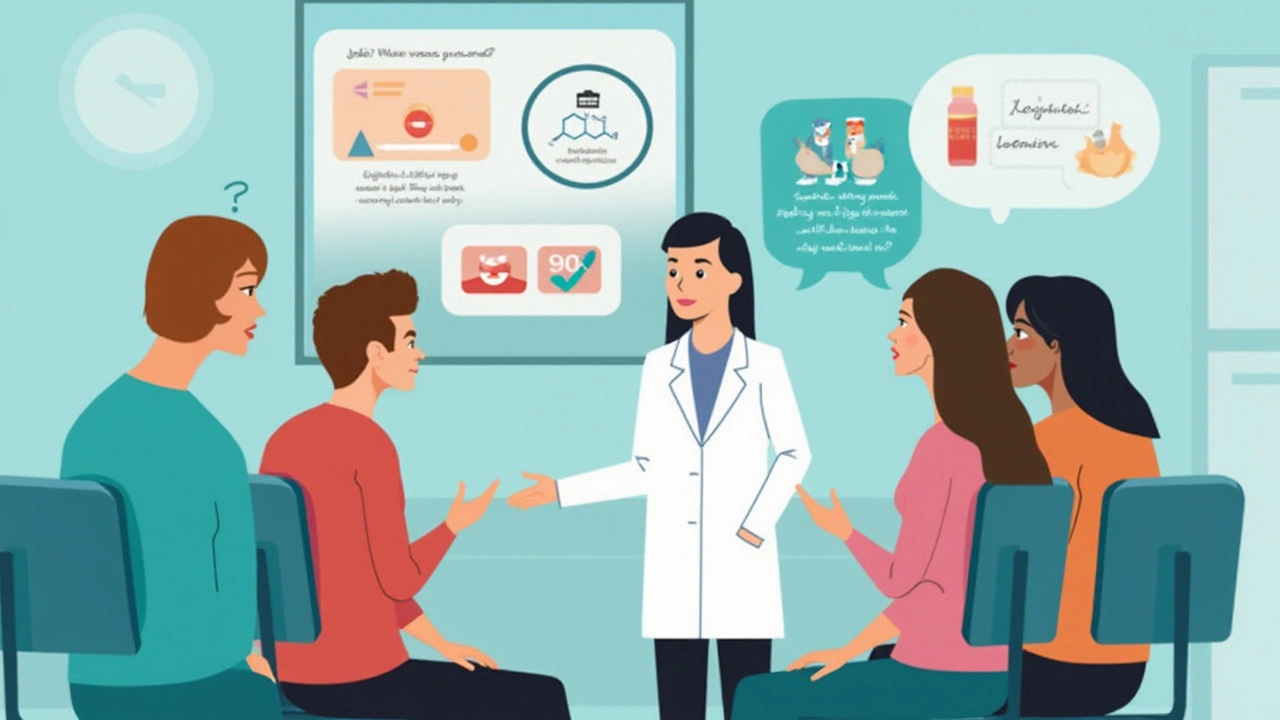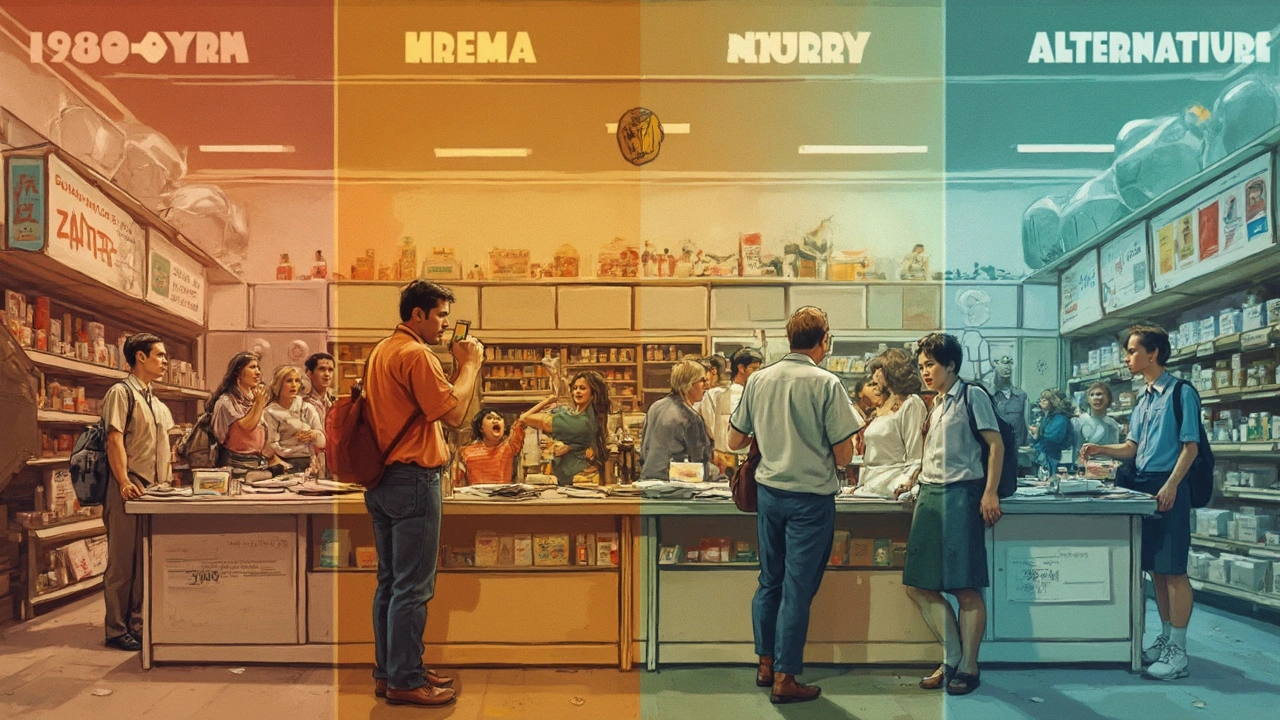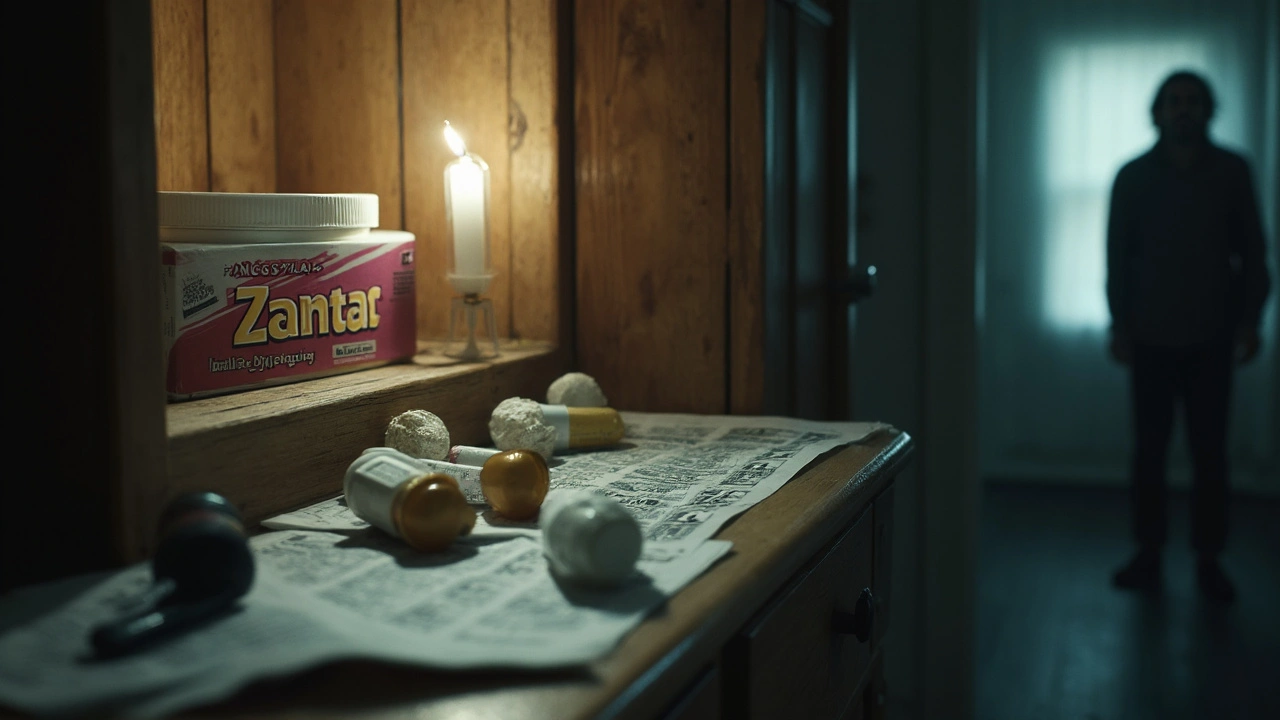Ever refilled a Zantac prescription and genuinely felt like you were solving your heartburn problem for good? You weren't alone. Zantac, known by its generic name ranitidine, was stacked everywhere: boots, corner shops, your GP's drawer. But then, what looked like a safe fix for stomach acid turned 2020’s pharmacy shelves upside down. Out of nowhere, worried headlines popped up about Zantac and cancer risks. By April 2020, pharmacists across the world boxed up every last pack and sent them back. If you or someone you care about ever popped a Zantac after a heavy chippy tea, you might have loads of questions—and to be blunt, the story behind all those recalls isn’t going away.
What Was Zantac, And Why Did It Become So Popular?
It’s wild how quickly a pill can go from hero to zero. Back in the 1980s, when Zantac hit the market, it felt like a real breakthrough. Doctors were handing it out left and right for folks battling acid reflux, heartburn, indigestion, or ulcers. Why? Because it genuinely worked—Zantac blocks histamine (a chemical your body uses to trigger stomach acid), so your stomach chills out and you get less burn. By the 1990s, Zantac was on the list of bestselling drugs worldwide. In fact, at the height of its fame, Glaxo (the UK pharma giant) raked in billions each year off Zantac alone.
Doctors liked Zantac because it had fewer side effects than its rival, Tagamet (cimetidine), which sometimes messed with your hormones. People could buy it over-the-counter as tablets, syrup, and even injection at the hospital. For many, Zantac was almost a lifestyle hack: eat richer food and still dodge heartburn. You’d find a pack in every chemist in Manchester, whether you were out on the Curry Mile or dodging rain by the Arndale. The brand had real trust, with around 13 million scripts written in the UK in a single year at its peak.
Things seemed steady for decades. No worries about cancer, contamination, or legal warnings. Zantac just worked—simple as that.

The Cancer Scare: Why Did Zantac Get Recalled?
The calm cracked in September 2019, when US and European health regulators detected tiny levels of a chemical called N-nitrosodimethylamine (NDMA) in batches of ranitidine. Here’s the blunt bit: NDMA isn’t just any old chemical. At high levels, it’s a probable human carcinogen. Studies in animals linked NDMA to cancer, and high exposures in drinking water have been tied to health problems. That was more than enough to freak out everyone from the FDA in America to the Medicines and Healthcare products Regulatory Agency (MHRA) here in the UK.
So, what actually happened? Turns out, ranitidine molecules aren’t perfectly stable—they can break down into NDMA, especially if stored in warm or humid places. Actual lab tests found the chemical in both prescription and over-the-counter Zantac—not just rare, one-off batches. That was worrying enough for a total recall. By April 2020, shelves were empty, and regulators advised patients to stop taking all ranitidine medicines, not just Zantac-branded versions.
It wasn’t just a British thing. In the US, the FDA told retailers to pull everything with ranitidine, including countless generics. The European Medicines Agency (EMA) and Canadian authorities did the same. It was global—over 40 countries yanked Zantac from sale. According to data presented by the FDA, ranitidine could contain NDMA at levels as high as 3,000 nanograms per tablet if stored under bad conditions—almost a thousand times higher than what the agency considered "safe" (96 nanograms per day).
The fallout was massive. By late 2020, thousands of lawsuits got filed across the US from people who believed Zantac gave them cancer—especially bladder, stomach, and liver cancers. Major drugmakers, including the British-born GlaxoSmithKline, found themselves in the headlines for all the wrong reasons. And here’s the kicker: after years of digging, no one’s ever convincingly shown that Zantac at normal doses definitely causes cancer in humans, but the uncertainty was enough for regulators to play it safe and pull it off the shelves.
| Year | Estimated UK Zantac Prescriptions | Zantac Product Sales (Global, £) |
|---|---|---|
| 1995 | ~11 million | £2.5 billion |
| 2005 | ~7 million | £1.1 billion |
| 2018 | ~4 million | £800 million |
If you’re reading this and you took Zantac for a long time, here’s what you need to know: The actual risk for any one person is small. Most people who took Zantac or ranitidine won’t get cancer because of it. Still, if you’ve got health worries—or just want a bit of peace of mind—have a real chat with your GP. No one likes uncertainty when it comes to cancer risk.

Life Without Zantac: Safer Alternatives and What To Do Now
If you ever relied on Zantac for heartburn or ulcers, the recall probably left you scrambling. One day, a safe old friend—the next, headlines about possible cancer. What now? The first thing to remember: there are loads of safe, proven options out there, and most are easy to get in the UK. Don’t go hunting for old packs online, and don’t try to stretch out leftovers. Medicines have expiry dates for a reason, and old ranitidine could mean higher NDMA levels.
So, what can you actually use instead of Zantac? Most people now get switched to a different class of meds called PPIs (proton-pump inhibitors)—drugs like omeprazole (Losec) or lansoprazole. These work even better than ranitidine for many folks since they cut acid production at a different step. GPs in Greater Manchester are writing more prescriptions for omeprazole and lansoprazole than ever before. You can buy a mild dose at any pharmacy, and, tested again and again, they don’t carry the same NDMA problem. As for side effects, PPIs are pretty well tolerated, though taking them for years can sometimes put you at risk for vitamin B12 deficiency or a bit of tummy trouble if you suddenly stop them.
For milder symptoms, you can use antacids (like Gaviscon or Rennie), which just neutralize existing stomach acid instead of blocking its production. They’re short-term fixes but get the job done for heartburn after a heavy meal or a sneaky late-night curry. There’s also famotidine, another H2 blocker that doesn’t break down into NDMA. It’s not as common as ranitidine once was in the UK, but pharmacies do now stock it—so you can always ask about it at the counter.
- Try eating smaller meals, especially in the evening
- Cut down on caffeine, spicy stuff, and alcohol if triggers your symptoms
- Don’t eat right before bed—give yourself at least two hours
- Lose weight if you’re carrying a bit more around your belly—that can really help reflux
- Prop up the head of your bed a few inches if nighttime heartburn keeps you up
So what about people hoping to get justice? Since 2020, there’s been a wild rise in legal cases, mostly out of America, where the class-action system rules. If you genuinely think you’ve been harmed and live in the UK, it’s worth speaking to a legal expert with experience in medical liability—but bear in mind, proving that Zantac definitely caused cancer for any individual person is tricky. There’s no guaranteed payout, and every case turns on details.
If you want to keep your risks low: stick with medicines approved by the NHS, only buy from reputable chemists, and avoid leftover stock bought online. Patients who switched from ranitidine to a PPI after the recall nearly always saw the same benefits for their symptoms, according to recent NHS follow-up studies. Make sure you report any weird side effects to the UK’s Yellow Card scheme—the MHRA actually reads those, and they do help keep us safer.
It’s hard to think something as mainstream as Zantac caused this much noise, but this is the reality of modern medicines: what seems safe today can shift tomorrow. You might never look at your medicine cabinet the same way again, but at least you’ll have the facts—and options.


Amanda Devik
July 17, 2025 AT 22:04This article really sheds light on such an important and often overlooked issue. I remember when Zantac was just a regular thing in our medicine cabinets, and now here we are with so many questions about safety and alternatives. It’s crucial to understand the science behind why regulators acted like they did, especially because many people took it daily without a second thought.
What's inspiring is that the piece also offers practical advice—not just fearmongering. Knowing what alternatives exist and how to navigate this whole situation helps people feel empowered rather than scared. I appreciate how it balances facts and empathy, giving a genuine sense of hope.
For anyone still unsure about what to do, this article is a supportive guide that encourages asking the right questions and seeking safe options. Honestly, information like this is a lifeline for those depending on such medications.
Mr. Zadé Moore
July 21, 2025 AT 04:44Finally, someone addressing the elephant in the room. The Zantac fiasco exploded because the pharmaceutical industry is riddled with negligence and poor regulatory oversight. It’s not just about some ingredient; it’s about systemic malpractice that endangers consumers worldwide.
This recall is a wake-up call demonstrating the failure of monitoring mechanisms. People who trusted their health to these drugs deserve better safeguards and transparency. I'm all for calling out the authorities responsible for this massive oversight and demanding accountability.
Also, the ongoing lawsuits are just the beginning. We need stricter legal frameworks and more robust scientific scrutiny to prevent such calamities in the future. Otherwise, it’s just a band-aid solution on a hemorrhage.
Brooke Bevins
July 24, 2025 AT 08:24Ugh, this whole Zantac situation has been so frustrating to watch unfold. I feel for the people who were duped into thinking it was safe for so long. Just knowing the risk is there makes me anxious!
I’m glad the article didn’t shy away from answering the tough questions, especially about ongoing lawsuits and alternatives. That kind of clarity helps when you’re stuck wondering if you’re risking your health every time you treat heartburn. 😕
Does anyone know if these alternatives are accessible and affordable? Because switching meds feels so overwhelming right now.
Vandita Shukla
July 27, 2025 AT 00:51Honestly, the discussion here could go deeper. The article did cover the facts well but missed some critical points about how this issue affects different populations globally.
For example, in countries where regulation might not be as stringent, how does the recall affect those who rely on generic or imported versions of Zantac? Are there any international guidelines being enforced?
I often find that global health considerations are overlooked in these narratives, and that’s a huge oversight, especially in India where access to medications needing stringent checks is limited.
Anyone with more insight on how we can ensure safe alternatives worldwide?
Susan Hayes
July 30, 2025 AT 08:24The drama around Zantac just shows the mess that happens when American healthcare prioritizes profits over people. We should have seen this coming—big pharma pushing meds without rigorous enough testing is classic.
It’s infuriating how long it took for this recall and how many people might have suffered because of corporate greed. I don’t trust anything that comes out of these companies without independent, rigorous trials.
Glad the lawsuits might finally make them pay, but it’s just a start. Everyone should be screaming for stricter regulations and transparency. Anything less is unacceptable.
Jessica Forsen
August 2, 2025 AT 05:31Wow, the whole Zantac mess is just a wonderful reminder of how much we love putting our faith in pills without questioning stuff. I mean, who’d have guessed a drug in your local pharmacy might have cancer-causing properties, right?
Not to downplay it — it’s a huge issue — but also kind of ironic how we all demand quick fixes but overlook the risks. The article does a solid job of laying down facts while gently pushing you to think critically about your health choices.
Also, the alternatives section is gold. Whether you're switching or just cautious, having options outlined means people can make smarter decisions rather than panicking.
Deepak Bhatia
August 4, 2025 AT 02:11I appreciate the positive approach here. This is tough news for many who trusted Zantac for relief, but knowing the facts helps us stay safe.
Sometimes, it’s better to have a clear explanation of why a medicine is recalled rather than rumors. This article’s way of breaking down the science is very approachable, which helps take away some fear.
If you’re worried about switching meds, take it slow and consult your doctor. There are safe options out there which might even work better for your personal situation.
Hope everyone finds relief without stress.
Samantha Gavrin
August 8, 2025 AT 17:24Not to fuel paranoia but has anyone else thought about the timing here? Suddenly, a big-name drug like Zantac gets yanked due to cancer risks? Seems awfully convenient for some secret agendas in the pharmaceutical industry.
What if this is a smokescreen for bigger issues or coverups? The article is thorough, but I worry that the whole picture is being sanitized.
I encourage readers to stay vigilant and question what’s not being said. These recalls often come with behind-the-scenes deals and losses disguised as safety.
Anyone else see or hear any unusual chatter about this?
NIck Brown
August 12, 2025 AT 13:51From an expert perspective, the scientific evaluation of ranitidine (Zantac’s active ingredient) and its N-Nitrosodimethylamine (NDMA) contamination is key to understanding the recall.
The article accurately highlights the metabolic pathways involved, where NDMA forms as a probable human carcinogen. This led regulators worldwide to invoke precautionary principles.
I find the explanation about safe alternatives timely because proton pump inhibitors (PPIs) or H2 blockers without NDMA contamination are possible switches but with their own risk profiles.
In clinical practice, it’s crucial patients don’t abruptly stop medications but instead consult healthcare providers for personalized advice.
Great article for raising awareness among the general public.
Andy McCullough
August 15, 2025 AT 13:11This summary is quite balanced and informative, thanks for posting it.
One question though—has anyone seen data on how long NDMA stays in the body after discontinuing Zantac? It would help users understand ongoing risks better.
Also, I’d be interested in hearing about any clinical trials underway for newer, safer alternatives or formulations designed to minimize such contaminants.
Science always moves forward, but transparency in these transitions would ease patient anxiety greatly.
Zackery Brinkley
August 16, 2025 AT 22:04Really helpful article. I’m in the UK and Zantac was pretty common here, too. It’s been confusing with all the news and recalls, so seeing a concise explanation with suggestions on what to do is a relief.
I didn’t know the carcinogen NDMA was involved — that’s scary but good to be aware of.
Thanks for emphasizing consulting doctors instead of just stopping meds — so important.
Hope more updates come out soon about the safest options going forward!